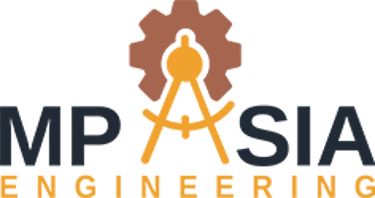What should I be aware of before doing a CNC Milling Project? Also, what should I look for in a company before picking them as vendor for our CNC Milling works?
Understand what you need to pay attention to before you start your CNC Milling project so you can save time & money and get your parts done successfully. Also, this article tells you exactly what you need to look for in a vendor to ensure you have success in the production of your tools
CNC MILLING SINGAPORE
Embarking on a CNC milling project requires careful planning and consideration to ensure success. Here at MP Asia Engineering we have come up 10 key factors to be aware of before starting your project: They are, Design and CAD Model, Material Selection, CNC Machine Capabilities, Toolpath and CAM Programming, Fixturing and Workholding, Cutting Parameters, Quality Control, Safety, Personal Protective Equipment (PPE), Cost and Time Estimation and Post-Processing. Let's get a little more specific on what needs to be looked at during each of these factors.


Design and CAD Model
Accuracy: Ensure your CAD model is accurate and detailed. Any errors in the design will be replicated in the final product.
Tolerances: Define the tolerances required for your part. CNC milling can achieve very tight tolerances, but specifying them clearly will help in the machining process.
Material Considerations: Design your part with the material properties in mind. Different materials have different machining characteristics and limitations.




Material Selection
Material Properties: Choose the right material based on the part's application, strength, durability, and machinability.
Cost: Consider the cost of the material and its availability.
Machinability: Some materials are easier to machine than others. For example, aluminum is generally easier to mill than stainless steel.
CNC Machine Capabilities
Axis Configuration: Understand the capabilities of the CNC machine you will be using. More axes (3-axis, 4-axis, 5-axis) allow for more complex geometries.
Tooling: Ensure the machine has the appropriate cutting tools for your material and design.
Workpiece Size: Make sure the machine can accommodate the size of your workpiece.
Toolpath and CAM Programming
Toolpath Strategy: Choose the right toolpath strategy (e.g., roughing, finishing) to optimize machining time and surface finish.
CAM Software: Use reliable CAM software to generate the G-code. Ensure the software settings match the capabilities of your CNC machine.
Simulation: Run a simulation of the machining process to check for any potential issues like collisions or inefficient toolpaths.
Fixturing and Workholding
Secure Clamping: Ensure the workpiece is securely clamped to prevent movement during machining, which can lead to inaccuracies or damage.
Accessibility: Make sure the fixture allows the cutting tool to access all necessary areas of the workpiece.
Cutting Parameters
Speed and Feed Rates: Optimize spindle speed and feed rates based on the material and tooling to achieve the best results and tool life.
Depth of Cut: Adjust the depth of cut to balance machining time and tool wear.
Quality Control
Inspection: Plan for inspection during and after machining to ensure the part meets the required specifications.
Measurement Tools: Use appropriate measurement tools (e.g., calipers, micrometers, CMM) to verify dimensions and tolerances.
By paying attention to these factors, you can increase the likelihood of a successful CNC milling project, producing high-quality parts efficiently and safely. This can also assist you to avoid getting cheated as it happens in many cases. This is one of the factors people often research on things to look out for before doing a CNC Milling project so they can be sure. Since we are on this topic let's also look at what you need to sniff out in a vendor before engaging them to do your CNC Milling project.
Choosing the right company for do your CNC milling project is crucial to ensure quality, efficiency, and cost-effectiveness. So MP Asia Engineering's team has come up with some key factors to consider when evaluating a CNC milling service provider:
1. Experience and Expertise
Industry Experience: Look for a company with a proven track record in your specific industry (e.g., aerospace, automotive, medical).
Technical Expertise: Ensure they have skilled engineers and machinists who are experienced in CNC milling and can handle complex projects.
2. Capabilities and Equipment
Machine Portfolio: Check if they have a range of CNC milling machines, including multi-axis capabilities, to handle different project requirements.
Tooling and Technology: Ensure they use advanced tooling and cutting-edge technology to achieve high precision and efficiency.
Material Variety: Verify that they can work with the materials you need, whether it’s metals, plastics, or composites.
3. Quality Assurance
Certifications: Look for certifications such as ISO 9001, which indicate a commitment to quality management systems.
Inspection and Testing: Ensure they have robust quality control processes, including in-process and final inspections using precise measurement tools like CMM (Coordinate Measuring Machines).
4. Design and Engineering Support
CAD/CAM Proficiency: Check if they offer design and engineering support, including CAD/CAM services, to help optimize your design for manufacturability.
Prototyping: If you need prototypes, ensure they can provide rapid prototyping services to test and refine your design.
5. Production Capacity
Volume Capability: Assess their ability to handle your production volume, whether it’s a single prototype or large-scale production.
Lead Times: Inquire about their typical lead times and ability to meet your project deadlines.
6. Cost and Quotation
Transparent Pricing: Request detailed quotations and ensure there are no hidden costs. Compare quotes from multiple providers to get a sense of market rates.
Value for Money: Consider the overall value, including quality, service, and support, rather than just the lowest price.
Safety
Personal Protective Equipment (PPE): Wear appropriate PPE, such as safety glasses and hearing protection.
Machine Safety: Follow all safety protocols for operating the CNC machine, including emergency stops and proper handling of cutting tools.
Cost and Time Estimation
Budget: Estimate the cost of materials, machine time, and any additional services (e.g., finishing).
Time: Plan the project timeline, including design, programming, machining, and inspection.
Post-Processing
Finishing: Consider any post-processing steps, such as deburring, polishing, or coating, that may be required after milling.
Cleaning: Clean the part thoroughly to remove any machining residues or coolant.
7. Customer Service and Communication
Responsiveness: Evaluate their responsiveness and willingness to answer your questions and provide updates.
Project Management: Ensure they have a dedicated project manager or point of contact to oversee your project and keep you informed.
8. Reputation and Reviews
Client Feedback: Look for reviews and testimonials from previous clients to gauge their reputation and reliability.
Case Studies: Review case studies or examples of similar projects they have completed successfully.
9. Location and Logistics
Proximity: Consider the location of the company and its impact on shipping costs and lead times.
Logistics Support: Check if they offer logistics and shipping services to deliver the finished parts to your location.
10. Sustainability Practice
Environmental Responsibility: Inquire about their sustainability practices, such as waste reduction, recycling, and energy-efficient manufacturing processes.
By thoroughly evaluating these factors, you can select a CNC milling company that aligns with your project requirements and ensures a successful outcome. Taking the time to choose the right partner will pay off in terms of quality, efficiency, and overall satisfaction with the final product.
Considering the 10 factors that we need to be aware of before doing a CNC milling project, along with these 10 factors to watch out for before selecting a vendor, will give you a very high chance of completing your CNC project without error.
We hope you enjoyed this read, If you are looking for CNC Milling services in Singapore, you can check out our CNC Milling page. We have been in the Singapore precision engineering market since 2015. You can visit our About Us page for more info on our company. For some customer feedback, you can visit our testimonials page.
If you are looking for some information on Singapore's market for CNC milling solutions, then you can check out this article, "What is the CNC milling industry like in Singapore? Who are some companies that provide CNC milling solutions in Singapore?"
We hope you enjoyed reading this article. If you have any questions or feedback regarding this article, feel free to contact us at blog@mpasiaengineering.com
Best Wishes
MP Asia Engineering Team
Singapore
Author of this article
Nixon Selvakumar
Director
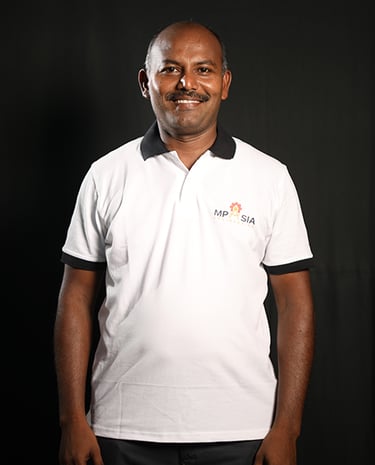



What is the CNC milling industry like in Singapore? Who are some companies that provide this solutions?
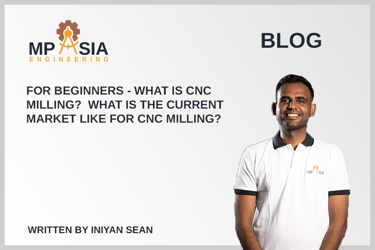

For beginners - what is CNC milling? What is the current market like for CNC milling?
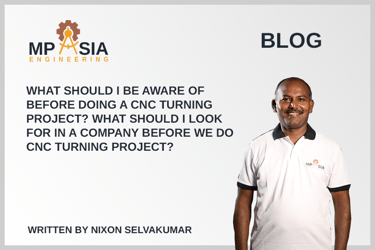

What should I aware of before doing a CNC turning project? What should I look for in a company before we do CNC turning project?
Related Blog Articles
Looking For CNC Precision Engineering Service? Get A Quick Quote!
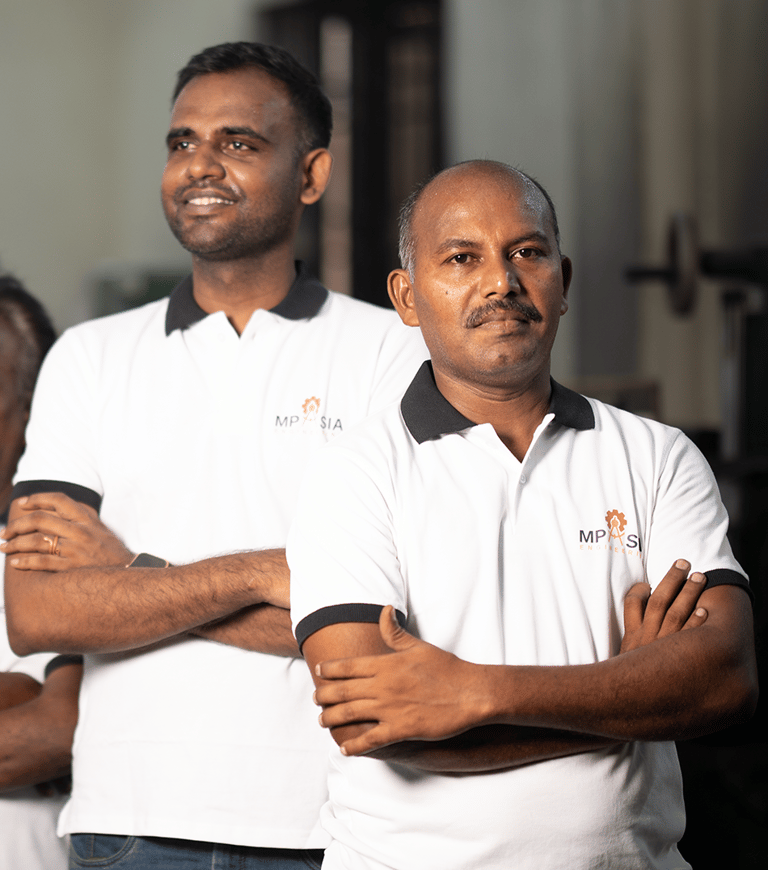

We have dedicated account managers that are available from Mon-Friday, 9am to 6pm SGT. Do fill out this form and we will get back to instantly.
Dedicated Account Manager
24 Turnaround For One-Off Prototype
Parts Delivered OTIF After Confirmation
From Singapore To World








